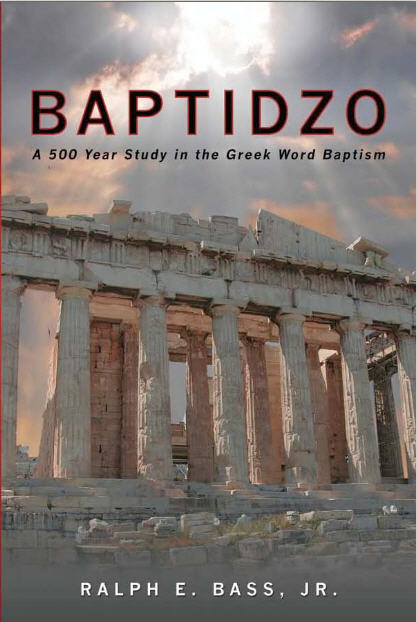
Hi, My Name Is Ralph Bass...This Is My Library


In our study of the history of Baptism, we are not saying that BAPTIDZO does not convey an act or mode but condition, result, state, or an effect accomplished brought about by any one of several possible acts, we are not saying that this, or any other verb, is not an action word. A verb will tend to convey action, but in and of itself this fact does not mean that a particular word conveys a specific mode or kind of action.
Let me illustrate. The word bury expresses a state or result or condition or an effect accomplished—not an action. It has the general meaning of envelopment within the earth.
This “envelopment” idea makes it a perfect illustration for our purposes in this
Let me illustrate. The word bury expresses a state or result or condition or an effect accomplished—not an action. It has the general meaning of envelopment within the earth.
This “envelopment” idea makes it a perfect illustration for our purposes in this

Subscribe to this Site
History of Baptism

work. Yet we are not told how that condition of envelopment or burial occurred. Perhaps a shovel was used to dig a hole and the person was let down into the grave;perhaps a backhoe was used to trench out a grave and a machine lowered the person; perhaps a ravine was found and the person was placed in it and covered with earth. Indeed, perhaps the person was “buried at sea” and thereby dropped into a watery grave. Yet many more acts are available, perhaps the deceased was slid sideways into a sepulcher hewn out of the rock or laid in a natural cave (as was our Lord). Perhaps he was lifted up on to a platform and there “buried” as was common with Native Americans. Or perhaps the person was set adrift in a small boat into the night and thereby met the criteria of burial in that culture. All these are the various “acts” possible in a burial, the word bury demanding none of them, but accommodating all of them in its meaning. And yet if it were said that, “The man buried the body.” The word buried would in itself be considered an action word, in fact a transitive verb. So, the point is not that BAPTIDZO is not used to convey action, only that the specific mode of action is unknown because it is not inherent in the word itself.
Let us use the above illustration to demonstrate the difficulty of translating one word from a language by one word from another language.
Let us use the above illustration to demonstrate the difficulty of translating one word from a language by one word from another language.
Let's Look Inside
the Book

A Point of Grammar
Let’s consider “bury” to be a word from a foreign language and the original word behind each of the underlined words above. It is your job to translate it in each sentence above. What “one” word do you use? Depending on the given circumstance, seven of the above eight translations given would be of questionable accuracy. What you might do is throw in the towel and transliterate the word “bury” into English and use it in every case, allowing the reader to make the mental transition in meaning, finding the mode in the context. That is what the translator of BAPTIDZO is forced to do.
So we conclude, in the study of the history of Baptism, BAPTIDZO tells you an action took place, however, it does not tell you which action. Instead, its meaning is found in the result of that action-the change of condition, result, state, or an effect accomplished that occurred as a result of that action.
In the history of Baptism, you will find various ways the word BAPTIDZO is used in the Greek world.
So we conclude, in the study of the history of Baptism, BAPTIDZO tells you an action took place, however, it does not tell you which action. Instead, its meaning is found in the result of that action-the change of condition, result, state, or an effect accomplished that occurred as a result of that action.
In the history of Baptism, you will find various ways the word BAPTIDZO is used in the Greek world.












































































































